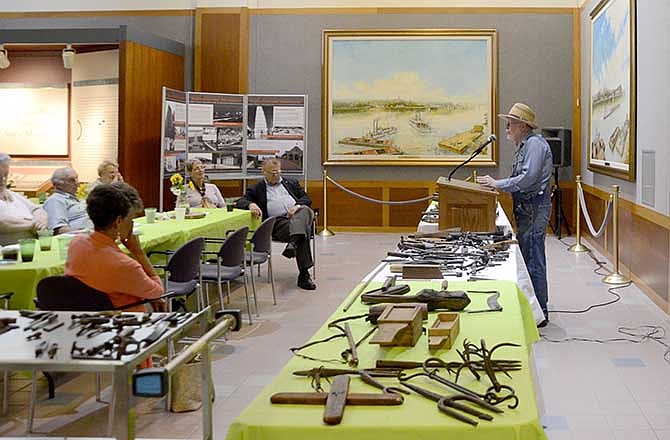Missourians had the chance Saturday to have old tools and materials identified by an archaeologist with the Institute for Traditional Ozark Crafts.
The session at the Missouri State Archives was part of the 2014 Friends of the Missouri State Archives' annual meeting.
Dr. James Price identified nearly a dozen tools that date as far back as the 1800s.
One tool was identified as a sugar devil, which was used in general stores in the 1800s. It is T-shaped with a spiral-looking spike on the end of it.
"A lot of sugar and dried fruits were shipped in wooden barrels and kegs," Price said. "This tool loosens the sugar in those barrels so you can get it out."
Nancy Grant said she and her husband, Michael Rodemeyer, brought the sugar devil because it's "quite an interesting tool."
The Hartsburg couple attended Saturday's event because they're interested in made-from-scratch, old tools.
"We're always on the look out for more informative information on old tools," Grant said. "Price is always informative, interesting and personable."
Price lives in Naylor, but grew up on a farm in Doniphan.
Born in 1944, Price said he grew up with some of the tools he identifies today.
"I grew up in a world where there was still horses and wagons," he said. "I went to a one-room school house."
He later attended the University of Missouri for an undergraduate degree in archaeology and earned a master's and doctorate from the University of Michigan.
Though retired, he currently works one day a week for the Institute for Traditional Ozark Crafts, which is affiliated with the National Park Service.
The institute "promotes the teaching and demonstration of those crafts employed by the Scots-Irish people of the southeastern Ozark Highland of Missouri."
Attendees of Saturday's event relied on Price's expertise to identify tools, some of them family heirlooms.
One attendee brought in a gnarled knife, and said it was found in a field. Price identified it as an old paring knife.
"If it came from the Germans in Missouri, a lot of times they ate a meal in the field around 10 a.m.," Price said.
He identified several other pieces, including a pick-looking tool used for stone masonry, a twivel used for mortising fence posts, a lever from an old piece of machinery and a kent pattern axe.

